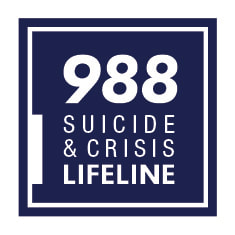|
The 988 Suicide & Crisis Lifeline is a national network of local crisis centers that provides free and confidential emotional support to people in suicidal crisis or emotional distress 24 hours a day, 7 days a week in the United States.
988 FAQ 
Psychiatrist, Dr. Tracey Marks, has a wealth of information, short videos and insight to better help you understand yourself, your symptoms and helpful tools and resources. Check out her Youtube channel "Mental Health Doesn't Have To Be a Mystery" HERE
Many of my clients present with generalized anxiety concerns, her series on ANXIETY is helpful to get the basic understanding of what is happening with your body and mind. Link HERE
Ever wonder what happens in our brain when we are dealing with intense emotions? Here is a great clip showing Dr. Dan Siegel's Hand Model of the Brain.
I'm sharing the helpful resources put together my MGH Psychiatry Services here. Online Support Groups
Self-Guided Virtual Resources Apps and Materials
The following links are listed to provide you with additional online mental health care information and counseling resources. Addiction and Recovery Alcoholics Anonymous Center for On-Line Addiction Drug and Alcohol Recovery Guides Infographic: The Twelve Steps of Recovery Infographic: Drug Abuse and your Body: Exposed SAMHSA's Substance Abuse/Addiction SAMHSA's Treatment and Recovery Web of Addictions Anxiety Disorders Answers to Your Questions About Panic Disorder National Center for PTSD Obsessive-compulsive disorder (OCD), Mayo Clinic Calm Clinic Tools for Anxiety Anxiety BC Associations & Institutes National Association of Social Workers American Academy of Child & Adolescent Psychiatry American Association for Marriage and Family Therapy American Counseling Association American Psychiatric Association American Psychological Association Association for Psychological Science Center for Mental Health Services National Institute of Mental Health Mental Health America Substance Abuse and Mental Health Services Administration Attention-Deficit Hyperactivity Disorder ADDA - Attention Deficit Disorder Association Attention-Deficit Hyperactivity Disorder, NIMH Born to Explore: The Other Side of ADD/ADHD BIPOC Support Developing Positive Racial Identity Melanin and Mental Health NAMI- Black/African American NAMI- Hispanic/Latinx NAMi- AAPI NAMI- Indigenous/Native Students of Color Support Page Asians Do Therapy AAKOMA Project Child Abuse and Domestic Violence Childhelp USA® SAMHSA's Children and Families SAMHSA's Protection and Advocacy Questions and Answers about Memories of Childhood Abuse The National Domestic Violence Hotline Website Chronic Fatigue Chronic Fatigue Syndrome Depression Bipolar Disorder News - Pendulum.org Depression and How Therapy Can Help Depression Screening Depression Test, Symptoms of Depression, Signs of Depression Developmental Disorders Asperger's Disorder NeuroWeb Yale Autism Program Diagnosis DSM-IV-TR: Diagnoses and Criteria Dissociation and Traumatic Stress Sidran Traumatic Stress Institute Eating Disorders Academy of Nutrition and Dietetics Something Fishy Gender Identity APA Transgender Information Transgender Resources Journals & Magazines ADHD Report Anxiety, Stress and Coping Autism Childhood Contemporary Hypnosis Dementia Depression and Anxiety Drug and Alcohol Review Dyslexia Early Child Development and Care Eating Disorders Educational Assessment Journal of Gambling Studies Journal of Happiness Studies Journal of Mental Health and Aging Journal of Sex & Marital Therapy Journal of Sport and Exercise Psychology Journal of Substance Abuse Treatment Language and Cognitive Processes Loss, Grief & Care Mental Retardation and Developmental Disabilities Metaphor and Symbol Neuropsychological Rehabilitation Parenting Personal Relationships Personality and Individual Differences Psychiatric Bulletin Psychology of Men & Masculinity Psychology Today Stress and Health Studies in Gender and Sexuality Substance Abuse Trauma, Violence & Abuse Mental Health Care General Links CounsellingResource.com Internet Mental Health Let’s Talk Facts, APA Mental Health Counselor Resources, About.com Mental Help Net PsychCentral.com Web Sites You Can Trust, Medical Library Association Obesity/ Weight Management Let's Move! Kids Eat Right Understanding Obesity Binge-Eating Disorder Body Image Movement Personality Disorders Mental Help Net - Personality Disorders Personality Disorders - Focus Adolescent Counselor Services Suicide Awareness and Hotlines SAMHSA's Suicide Prevention Suicide Awareness Voices of Education Suicide: Read This First Additional Mental Health Care & Counseling Resources Disaster/Trauma HIV/AIDS Interpretation of Dreams Keirsey (Myers-Briggs) Temperament Sorter Signs of Menopause, Symptoms of Menopause Note: Not responsible for the content, claims or representations of the listed sites. This vulnerable and unpredictable time we are living is testing us in many ways. We are all in different situations, negotiating an assortment of challenges. For some, the fear of scarcity and daily uncertainty is not a novel experience, for others it challenges the safety net they’ve been privileged to not even think about until now. However, this time we are experiencing what Brené Brown calls “an experiment of collective vulnerability”-- one in which directions haven’t been written for. We are narrating this time as we adapt to this new reality of living during the COVID-19 pandemic.
I’ve been digging large holes in my backyard, 3 feet deep and 3 feet wide. The soil is a rich brown, earthworms pop through as the shovel awakens their winter slumber. I dig until I hit the sandy layer, an indication that I’ve dug deep enough. I battle with the many roots, old, gnarly and some sustaining the large oak tree nearby. A row of deep green arborvitae trees await a spot in their new home where their roots can settle in and grow. The “stay home” order allows me the time for this home project, sooner than planned. When feeling stressed or overwhelmed, I go outside, take a walk, dig in the garden, take photos of the emerging blossoms or sit, take deep breaths of fresh air and listen to the orchestra of sounds around me. This is what “self-care” looks like to me as a middle-aged adult and parent. There are many suggestions out there for self-care these days. I challenge us to take this time to appreciate the variety of ways people are coping; the small moments, the simple and the undiscovered. Below is a list of collected “self-care” recommendations and links to exercises and resources. Physical Care:
Mental Health Care:
All this is to say these are stressful, unpredictable times and you need to take care of yourself. Remember there is no correct way to be feeling right now, what you feel is what you feel. It’s helpful to recognize that your feelings aren’t who you are. (“I feel angry” vs. “I am angry”) Within your control are some of the choices you can make to care for yourself in this challenging time. In the meantime, while there is a break in the rain, I’ll take some deep breaths, go back outside with my shovel and continue digging in the dirt. Stay safe out there. "My body is not an ornament. It is the vehicle to my dreams" - TB There is a powerful documentary that all women should see. EMBRACE, directed and produced by Taryn Brumfitt. Taryn is the founder of the Body Image Movement and an activist. There is an upcoming screening of EMBRACE in the Boston area: April 30, 2017 at 1 PM, Showcase Super Lux, Brookline, MA Please order tickets here The documentary may also be viewed by purchasing or renting on iTunes. Mindful Eating can be a good beginning space to integrate mindfulness into your daily life. First, practice eating mindfully a least one meal a week and increase frequency as it allows.
There are several publications on Mindful Eating that may interest you: NY Times Article: http://www.nytimes.com/2012/02/08/dining/mindful-eating-as-food-for-thought.html Savor: Mindful Eating Mindful Life. by Thich Nat Hahn and Lilian W. Y. Cheung, D.Sc., R.D. Eating Mindfully: How to end mindless eating and enjoy and balanced relationship with food. By Susan Albers, PsyD and Lilian W. Y. Cheung, D.Sc., R.D. Dr. Cheung's list 7 main principles for Mindful Eating Practice: 1. Honor the Food 2. Engage in all your senses 3. Be mindful of portion sizes 4. Chew 5. Eat Slowly 6. Do not skip meals 7. Eat a plant based diet |
ResourcesIf you are an active client in my practice, you may access additional resources on this site. Directions for access may be given during our session. Thank you.
Archives
May 2023
Categories |


 RSS Feed
RSS Feed